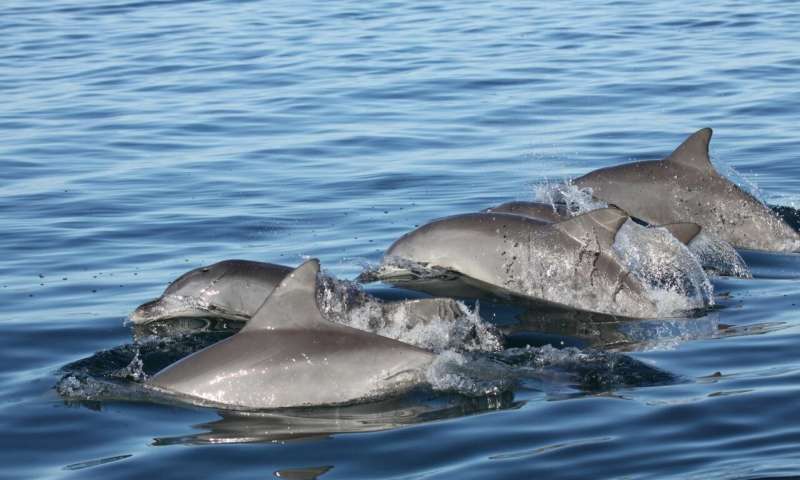

1.weaning (n.)
the act or process of causing a baby or young animal to stop feeding on its mother’s milk and to start eating other food
2. remote(adj.)
far away in distance
3.venture (v.)
to risk going somewhere or doing something that might be dangerous or unpleasant, or to risk saying something that might be criticized
5. flippers (n.)
one of two parts like arms on the bodies of some sea creatures, such as seals and penguins , used for swimming
6. savvy (n.)
practical knowledge and ability
7. preferences (n.)
the fact that you like something or someone more than another thing or person
4. flit(v.)
to fly or move quickly and lightly
Young dolphins pick their friends wisely

Strategic networking is key to career success, and not just for humans. A new study of wild bottlenose dolphins reveals that in early life, dolphins devote more time to building connections that could give them an edge later on.
Researchers at Georgetown University and Duke University report that dolphins under age 10 seek out peers and activities that could help them forge bonds and build skills they’ll need in adulthood.
For the current study, the team focused on data collected on youngsters from weaning to age 10, looking at who they hung out with and how they spent their time when no adults were around.
Around 3 or 4 years old, dolphins leave the protection of their mothers to venture off on their own, living in ever-changing groups that come together, split up and come together again in different combinations.
The study revealed that, even though young dolphins flit from group to group as often as every ten minutes throughout the day, they tend to spend more time with a few close friends.
Males prefer to hang out with other males; females with other females. But the researchers observed that males and females tend to interact in different ways. Males were more likely than females to spend their time together resting or engaged in friendly physical contact: rubbing flippers, swimming close together and mirroring each other’s movements. Whereas females socialized less often, and instead spent twice as much time as their male counterparts foraging for fish.
These differences suggest that the social lives of young dolphins may be shaped by the upcoming demands of adulthood, Galezo said.
For adult males, having other males in their corner is key to have a chance at passing on their genes. In Shark Bay, groups of two to three male dolphins often join forces to get fertile females alone with them and coerce them to mate. By the time they grow up, males will need to have enough social savvy to build and maintain strong alliances, or lose out on their chance to get a girl.
Being a successful adult female, on the other hand, means caring for calves that aren’t weaned until they’re at least three years old. Nursing moms need more calories, and so young females may spend more time foraging to practice skills they’ll need later on, before the full realities of motherhood set in.
https://phys.org/news/2020-07-young-dolphins-friends-wisely.html

1.What could be the reason why male and female interact differently?
2. Do you think dolphins are like human beings also in terms of caring their youngsters?
Don't look for the solution. Look for the alignment. It will bring the solution.
Abraham

 Advanced
Advanced
